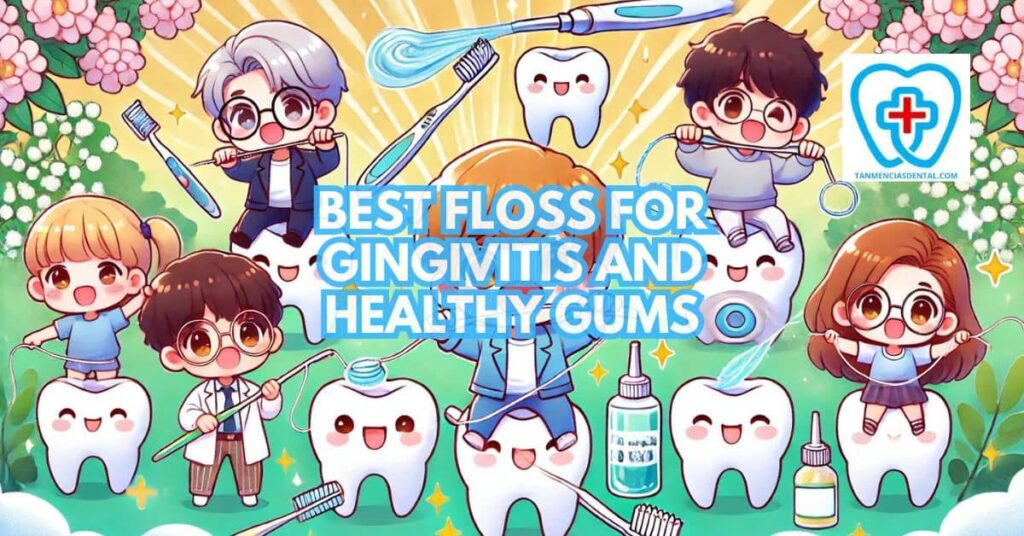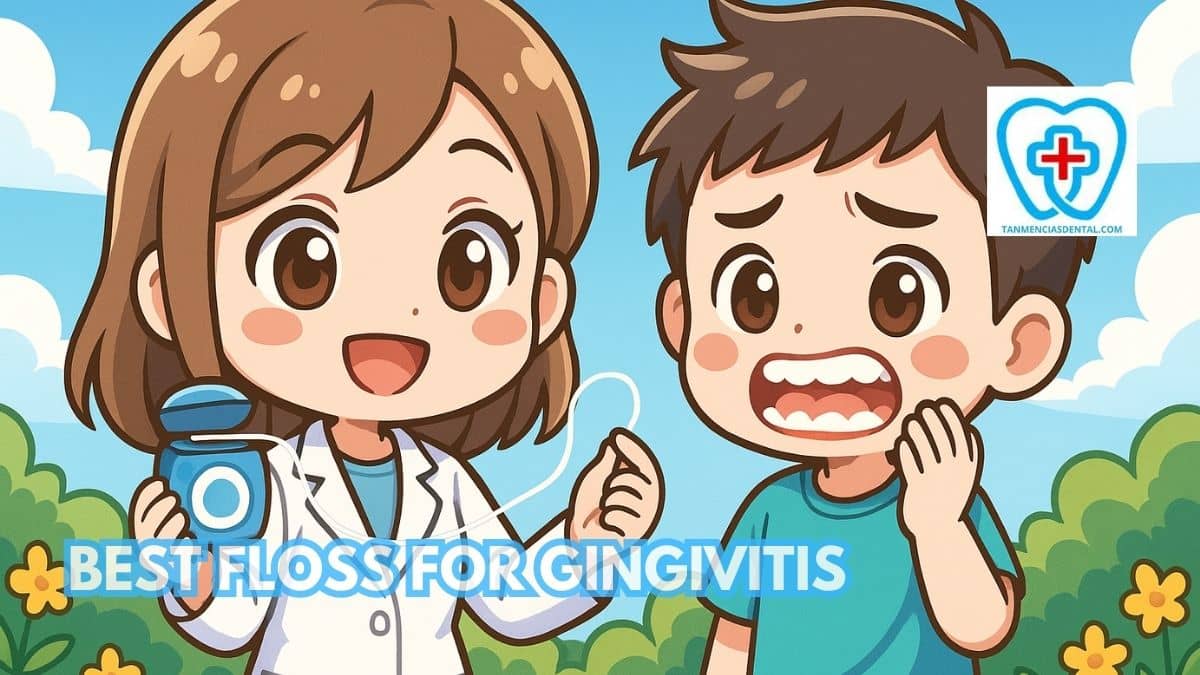Flossing helps remove plaque and food stuck between your teeth, which a toothbrush cannot always reach.
It is an important part of keeping your gums clean and free from disease like gingivitis.
Using the best floss for gingivitis can make this daily habit easier and more effective.
Flossing every day also lowers your chances of cavities and keeps your mouth feeling fresh.
We’ll help you in choosing the right floss and building a strong routine for healthy gums.
1. Understanding Gingivitis: Why Flossing Wins the Battle
Gingivitis is a common and mild form of gum disease that causes irritation, redness, and swelling of your gums.
It’s primarily caused by the buildup of plaque, a sticky film of bacteria that forms on teeth and gums.
When plaque is not removed, it can harden into tartar, which can only be removed by a dentist.
Flossing is effective in removing plaque from between teeth and below the gumline, areas that a toothbrush often misses.
Using a flosser can help make this process easier and more efficient.
Some types of floss may shred when used, especially if you have tight spaces between your teeth, so it’s important to choose a sturdy floss.
By flossing daily, you can prevent plaque buildup and tartar formation, keeping your gums healthy and free from gingivitis.
Regular flossing is crucial in the fight against gingivitis and for maintaining overall oral health.
🦷 How Much Does It Cost for a Dental Checkup?
2. Flossing Benefits: A Brighter Smile and Healthier Gums
Flossing offers numerous benefits beyond just preventing gum disease.
It helps to remove food particles and plaque that can cause bad breath, ensuring your mouth feels fresher.
Healthy gums also mean less bleeding and inflammation when you brush or floss.
Consistent flossing can lead to healthier gums, which support your teeth better and contribute to a brighter, more confident smile.
Moreover, flossing can prevent dental problems that could lead to costly treatments down the road.
🦷 How Long Should You Brush Your Teeth With Braces?
3. How Your Diet Affects Gum Health and Flossing Results
The food you eat has a direct effect on your gums and teeth.
Sugary and starchy foods can stick to your teeth, leading to plaque buildup and swollen gums.
Eating crunchy vegetables, like carrots or celery, can help scrape away plaque naturally as you chew.
Foods high in calcium, such as milk and cheese, help strengthen teeth and support healthy gums.
By choosing healthier foods, you can make flossing easier and more effective in preventing gum disease.
🦷 How a Timer for Brushing Your Teeth Can Make You a Brushing Master
4. Choosing the Best Floss for You: Unraveling the Floss Mystery
With many types of dental floss available in stores, picking the right one can be a challenge.
The best dental floss for you depends on your teeth spacing, gum sensitivity, and what feels most comfortable to use every day.
Waxed floss is smooth and can slide easily between tight teeth, while unwaxed floss may make a slight squeaking sound that some people find helpful, as it shows contact with the tooth surface.
Dental tape is flat and wide, which works well for people who have more space between their teeth.
Floss picks are small tools with a short piece of floss stretched across a handle, making them easier for some people to hold and use.
Super floss is a special kind of floss made for people with braces, bridges, or other dental work, and it has three parts to help clean around these areas.
Choosing the best dental floss is not the same for everyone, so it is important to try different types and see which one helps you clean your teeth thoroughly and comfortably.
🦷 How To Make Brushing Teeth Fun For Toddlers

5. Mastering the Flossing Technique: Reaching Every Corner for Gingivitis Control
Proper flossing technique is essential for effectively removing plaque and preventing gingivitis.
Start by using about 18 inches of floss, winding most of it around each middle finger, leaving an inch or two to work with.
Gently slide the floss between your teeth and curve it into a C-shape against the side of each tooth.
Move the floss up and down, making sure to go below the gumline without snapping or forcing it.
Consistent, gentle technique ensures you reach every corner of your mouth, keeping your gums healthy.
🦷 Why Are Tooth Doctors Important for Your Family’s Dental Care?
6. How Often Should You Floss? Daily Defense for Happy Gums
Flossing should be a daily habit to maintain optimal gum health and prevent gingivitis.
Dental professionals recommend flossing at least once a day, preferably before bedtime.
This routine helps remove plaque and food particles accumulated throughout the day, reducing the risk of gum inflammation.
For those who eat foods that easily get stuck between teeth, flossing after meals can also be beneficial.
Regular daily flossing creates a strong defense against gum disease and keeps your gums happy and healthy.
🦷 What are The Best Products for Gingivitis That Actually Work
7. Beyond Flossing: Building a Complete Oral Hygiene Routine
While flossing is crucial, it should be part of a comprehensive oral hygiene routine.
Brushing twice a day with fluoride toothpaste is essential for removing plaque from the surfaces of your teeth.
Using an antimicrobial mouthwash can help reduce bacteria and freshen your breath.
Regular dental checkups and professional cleanings are also important to catch any issues early and maintain overall oral health.
Combining these practices with daily flossing ensures a thorough approach to keeping your mouth healthy.
🦷 Can Toddlers Use Electric Toothbrushes?
8. Flossing Difficulties? Don’t Fret, There’s a Floss for You!
If traditional flossing is challenging, there are several alternatives to make the process easier.
Different types of dental floss, such as string floss and dental tape, cater to various needs and preferences.
Floss picks and interdental brushes can be easier to handle and just as effective as regular string floss.
Water flossers, which use a stream of water to clean between teeth, are another great option for those with dexterity issues.
Dental tape is broader and can be more comfortable for people with larger gaps between their teeth, providing thorough cleaning without discomfort.
For individuals with braces or other dental appliances, specialized floss threaders can help navigate around these obstacles.
No matter your difficulty, there’s a flossing tool that can help you maintain healthy gums and ensure effective plaque removal.
🦷 Shield Your Smile: Acidic Foods to Avoid for Teeth
9. When to See a Dentist: Maintaining Optimal Oral Health
Regular dental visits are vital for maintaining oral health and preventing gum disease.
Dentists recommend checkups and cleanings at least twice a year.
If you notice persistent gum bleeding, swelling, or pain while flossing, it’s essential to see a dentist sooner.
Professional cleanings remove tartar that cannot be eliminated by brushing and flossing alone.
Dentists can also provide personalized advice on flossing techniques and tools to improve your oral hygiene routine.
🦷 Can Tooth Decay Make You Sick?
10. Sustainable Flossing Options: Eco-Friendly Floss for a Healthy Smile
Eco-friendly flossing options are available for those who want to reduce their environmental footprint.
Biodegradable floss made from materials like silk or bamboo can be an excellent alternative to traditional nylon floss.
Some brands offer compostable floss picks or reusable floss handles to minimize waste.
Choosing eco-friendly products helps protect the environment while maintaining oral health.
Sustainable flossing choices allow you to care for your gums and the planet simultaneously.
🦷 Is It Bad To Not Brush Your Teeth?
11. The Power of a Healthy Smile: A Winning Combination of Brushing and Flossing
A healthy smile results from the combined efforts of regular brushing and flossing.
Brushing removes plaque from the surfaces of your teeth, while flossing cleans between teeth and below the gumline.
This combination ensures thorough plaque removal and reduces the risk of cavities and gum disease.
Consistent oral hygiene practices contribute to overall health and confidence.
Together, brushing and flossing form a powerful duo for maintaining a winning smile.
🦷 Experienced Family Dentists in Marikina City
👨⚕️ Conclusion
Flossing is a simple yet effective practice for achieving and maintaining healthy gums.
Choosing the right floss and using proper techniques can prevent gingivitis and other gum diseases.
Incorporating flossing into your daily routine ensures a lifetime of strong, healthy gums.
Regular dental visits and a comprehensive oral hygiene routine complement the benefits of flossing.
Commit to flossing daily and enjoy the long-term benefits of a healthy, confident smile.
😊 Self-Promotion
Visit Tan-Mencias Dental Clinic in Parang, Marikina City, for exceptional dental care in a friendly and welcoming environment.
Our dedicated team is here to ensure your smile stays bright and healthy.
For any questions or to schedule an appointment, you can call us at 9171451074, message us on our Facebook page, or use our website’s contact form.
We look forward to helping you achieve optimal oral health.
Come experience the difference at Tan-Mencias Dental Clinic!

